Abstract Acceptance Letter for Project
Dear [Recipient Name],
Thank you for submitting your abstract titled [Abstract Title] for project [Project Name].
The committee has reviewed your abstract and would like to gladly convey to you their acceptance decision.
What's next?
The final approval of the project is pending your discussion with the committee where your abstract and project will be reviewed in more detail. For this discussion please prepare a small presentation with points you would like to highlight. The date and time will be set any time this week and shared with you accordingly.
Congratulations and well done!
Best Regards
Abstract Acceptance Letter for Conference or Event
Dear [Recipient Name],
This with regards to the abstract titled [Abstract Name] that you submitted on [Insert Date] for the opportunity to be a guest speaker at [Conference or event name].
Upon reviewing your abstract, we are glad to inform you that it has been accepted and it is now listed among other candidate submissions.
We can't confirm a speaker spot at this time. To do that, we have to setup a 15 minutes video call to further discuss your abstract and the corresponding presentation. A member of your team will in contact with you to set up a mutually convient date and time.
Please be informed that the time allocated for each guest speaker is 15 minutes. Your presentation must adhere to this time limit. For the full list of requirements and regulations, please visit the rules page on [Link or URL].
For now I can only say congratulation and best of luck.
Hope to see you on our panel very soon.
Best Regards
Abstract Acceptance Letter for Conference or Event
Dear [Recipient Name],
Thank you for submitting your abstract titled [Abstract Name] and for being interested to be a guest speaker at [Conference or event name].
The committee has reviewed and accepted your abstract. Congratulations!
To confirm your attendance, you are required to send your confirmation no later than [Deadline] to [Email Address] along your full presentation for final review.
Please be reminded that presentations are limited to 15 minutes.
Please read the full requirement list that is published on our website if you haven't already done so.
If you have any questions or doubts, please feel free to email us.
Wishing you the best of luck. We look forward to see you soon.
Best Regards
Abstract Acceptance Letter for a Research Paper
Dear [Recipient Name],
We have received your research paper abstract titled [Paper name] that you submitted on [Submission Date] and would like to gladly inform you that it has passed the initial screening and went into the acceptance phase.
This means that your paper will considered for the our next publication on [Month and Year].
Please allow me to outline the process from point onwards.
First, we expect your full paper to be submitted no later than [Insert Date] for review.
Second, we expect you to present your paper to the committee for discussion and review. Please prepare a small presentation not longer than 10 minutes where you highlight the key points in your research.
Finally, upon successful review, your research paper shall be considered for the upcoming issue.
If you have further questions, please get in contact with me.
Congratulations and best of luck.
Best Regards
Abstract Acceptance Letter for an Academic Paper, Collage Paper, or Essay
Dear [Recipient Name],
I'm glad to inform you that the abstract for your paper/essay titled [Title of the paper or essay] has been accepted by the committee.
Following, you need to submit the full paper no later than [Deadline for paper submission].
Please continue to follow the submission guidelines that were shared with you earlier with regards to paper length, characteristics, and presentation requirements.
For now, I can only congratulate and you wish you the best.
Best Regards
Abstract Acceptance Letter for a Journal Article
Dear [Recipient Name],
Thank you very much interest in publishing your article on our journal [Website, magazine, publication, etc..].
We have received your abstract titled [Article Title] and upon review decided to accept and consider for the next issue.
Congratulations!
In order to get your article published, we need to receive the full literature for a second review by the committee.
Please send to us no later than [Deadline] keeping in mind the publication guidelines outlined on our website.
Looking forward to seeing your article published very soon.
Best Regards
Abstract Acceptance Letter for a Dissertation, Thesis, or PHd Thesis
Dear [Recipient Name],
Congratulations, your abstract titled [Thesis or dissertation title] has been accepted by the committee.
This means that you may now start working on your thesis with your professor in charge.
Please familiarize yourself with thesis guidelines if you haven't already done so. The guidelines can be found the the university portal.
Also please be reminded the deadline for submission is [Insert Date].
Wishing you the best of luck.
Best Regards
Abstract Acceptance Letter For An Internship report
Dear [Intern Name],
Thank you for submitting your abstract, it was a pleasure to read and looks very promising.
After detailed review, we decided to accept it with minor changes.
This means that you may now start working with your team head on your report.
If you have any questions, please revert back to me at anytime.
Well done and best of luck.
Best Regards
Conference Abstract Acceptance Letter
Subject: Acceptance of Your Abstract – [Conference Name]
Dear [Author Name],
We are pleased to inform you that your abstract titled "[Abstract Title]" has been accepted for presentation at the [Conference Name] scheduled on [Date]. Your research demonstrates significant contribution to the field of [Field/Topic].
Please review the attached guidelines for preparing your presentation. We look forward to your participation.
Sincerely,
[Conference Chair Name]
[Conference Name]
[Contact Information]
Journal Paper Abstract Acceptance Letter
Subject: Abstract Acceptance Notification – [Journal Name]
Dear [Author Name],
We are delighted to inform you that your abstract "[Abstract Title]" has been accepted for publication in [Journal Name]. Your research findings contribute valuable insights to the field of [Research Area].
Kindly submit the full manuscript by [Deadline Date] following our journal formatting guidelines. Congratulations on this achievement.
Best regards,
[Editor-in-Chief Name]
[Journal Name]
[Contact Information]
Thesis Abstract Acceptance Letter
Subject: Acceptance of Thesis Abstract – [University Name]
Dear [Student Name],
We are pleased to inform you that your thesis abstract titled "[Abstract Title]" has been approved by the [Department Name] committee. Your work shows promising research and aligns with academic standards.
Please proceed with the submission of the full thesis by [Submission Date]. Congratulations on this milestone.
Sincerely,
[Supervisor/Committee Chair Name]
[Department Name]
[University Name]
Research Abstract Acceptance Letter
Subject: Research Abstract Acceptance Confirmation
Dear [Researcher Name],
We are pleased to confirm the acceptance of your research abstract "[Abstract Title]" for the upcoming [Event/Conference Name]. Your contribution is highly valued and we look forward to your presentation.
Please ensure your abstract complies with the attached presentation guidelines. Thank you for your valuable work.
Best regards,
[Coordinator Name]
[Event/Conference Name]
[Contact Information]
Preliminary Abstract Acceptance Letter
Subject: Preliminary Acceptance of Abstract – [Conference/Journal Name]
Dear [Author Name],
Your abstract "[Abstract Title]" has been preliminarily accepted for [Conference/Journal Name]. This acceptance is subject to minor revisions as indicated by the reviewers.
Please submit the revised abstract by [Date] to confirm final acceptance. We look forward to your continued participation.
Sincerely,
[Editorial/Conference Team]
[Contact Information]
Creative Research Abstract Acceptance Email
Subject: Your Abstract Has Been Accepted!
Hi [Author Name],
Exciting news! Your abstract "[Abstract Title]" has been accepted for [Event/Journal Name]. Your innovative research in [Field] impressed our review committee.
We can’t wait to see your full presentation/paper. Please follow the attached instructions for next steps.
Cheers,
[Event Coordinator/Editor Name]
[Event/Journal Name]
Formal Abstract Acceptance Letter for Multiple Authors
Subject: Acceptance of Submitted Abstract – [Journal/Conference Name]
Dear [Author Names],
We are pleased to inform all contributing authors that the abstract "[Abstract Title]" has been accepted for [Conference/Journal Name]. Your collective research demonstrates significant findings in [Field/Topic].
Please adhere to the guidelines provided for submission of the full manuscript or presentation. Congratulations to all contributors.
Sincerely,
[Editor/Conference Chair]
[Journal/Conference Name]
[Contact Information]
What / Why of an Abstract Acceptance Letter
An Abstract Acceptance Letter formally notifies authors that their research abstract has been accepted for presentation, publication, or evaluation. Its purposes include:
- Confirming the acceptance status of the abstract.
- Providing instructions for submission of the full manuscript or presentation.
- Establishing timelines, deadlines, and guidelines for next steps.
- Acknowledging the author’s contribution and validating the research.
Who Should Send an Abstract Acceptance Letter
- Conference organizing committees.
- Journal editorial boards.
- University or academic department committees.
- Research institutions or funding bodies approving submissions.
Whom the Letter Should Be Addressed To
- Individual authors or multiple authors of the research.
- Corresponding author designated for the submission.
- Graduate or undergraduate students submitting thesis abstracts.
- Principal investigators or team leaders in collaborative research.
When to Send an Abstract Acceptance Letter
- After the review process of abstracts by peers or committees.
- Once the abstract meets criteria for inclusion in a conference, journal, or thesis requirement.
- Prior to presentation scheduling or manuscript submission deadlines.
- Upon preliminary or conditional acceptance requiring revisions.
How to Write and Send an Abstract Acceptance Letter
- Verify abstract approval and review feedback if applicable.
- Use a professional and formal tone for academic or research contexts.
- Include the title of the abstract, author name(s), and acceptance status.
- Provide instructions for full paper submission, revisions, or presentation details.
- Attach guidelines, deadlines, and contact information.
- Send digitally via email or as an official letter on institutional letterhead.
How Many Letters Are Typically Sent
- One letter per accepted abstract per author or corresponding author.
- Multiple authors receive a single letter addressed collectively, if preferred.
- Organizers may send additional reminders or follow-up letters for revisions or schedules.
FAQ About Abstract Acceptance Letters
-
Q: Can I submit revisions after acceptance?
A: Yes, if indicated as preliminary acceptance or subject to reviewer feedback. -
Q: Do I need to confirm acceptance?
A: Often, authors are requested to confirm participation or submission of the full manuscript. -
Q: Are these letters considered formal proof of acceptance?
A: Yes, they serve as official documentation for conference registration, funding, or academic records.
Requirements and Prerequisites Before Sending
- Complete abstract review and approval process.
- Ensure clarity on deadlines for full manuscript or presentation submission.
- Prepare acceptance guidelines, templates, and formatting instructions.
- Confirm author contact information and co-author details.
Formatting Guidelines for Acceptance Letters
- Length: One concise page or email message.
- Tone: Formal, professional, and congratulatory.
- Structure: Subject, greeting, abstract details, acceptance confirmation, next steps, closing.
- Attachments: Guidelines for manuscript submission or presentation preparation.
- Mode: Email for rapid communication, printed letter for official documentation.
After Sending / Follow-up
- Ensure receipt acknowledgment from the author.
- Provide reminders for deadlines or required revisions.
- Answer queries related to presentation schedules, manuscript formatting, or conference participation.
- Maintain records for academic, conference, or publication tracking.
Pros and Cons of Sending Abstract Acceptance Letters
Pros:
- Confirms acceptance and motivates authors.
- Provides official record for conferences or publications.
- Establishes clear next steps and deadlines.
Cons:
- Mistakes in author names or abstract titles can cause confusion.
- Delays in sending may affect planning and registration.
- Miscommunication may lead to non-compliance with submission guidelines.
Compare and Contrast with Similar Letters
- Full Paper Acceptance: Abstract acceptance is preliminary; full paper acceptance confirms publication or presentation.
- Rejection Letters: Opposite in purpose; abstract acceptance encourages participation.
- Notification Emails vs. Letters: Emails are faster; letters on official letterhead may be required for formal records or visa applications.
Tricks and Tips for Effective Abstract Acceptance Letters
- Include abstract title and author(s) prominently.
- Attach clear submission guidelines and deadlines.
- Maintain a professional and positive tone.
- Specify any conditions for preliminary acceptance.
- Personalize letters if multiple authors or contributors are involved.
Common Mistakes to Avoid
- Misspelling author names or abstract titles.
- Omitting deadlines or submission guidelines.
- Using overly casual tone in formal academic contexts.
- Failing to mention revisions or preliminary acceptance conditions.
Elements and Structure of an Abstract Acceptance Letter
- Subject/Title: Clearly indicate acceptance and abstract title.
- Greeting: Personalized for author(s).
- Introduction: State acceptance and context (conference/journal/thesis).
- Body: Provide details on next steps, deadlines, and guidelines.
- Closing: Congratulatory remarks and contact info.
- Attachments: Submission templates, presentation guidelines, or formatting instructions.
- Signature: Committee chair, editor, or authorized representative.
Does it Require Attestation or Authorization?
- Official acceptance letters often require signature or approval from conference chairs, journal editors, or academic supervisors.
- Letters on institutional letterhead provide authenticity and may be needed for official records, visas, or funding applications.
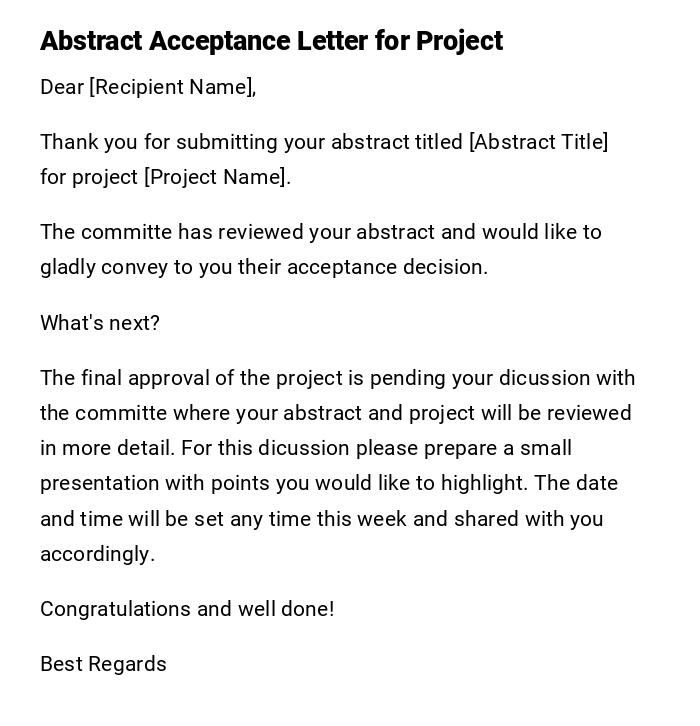
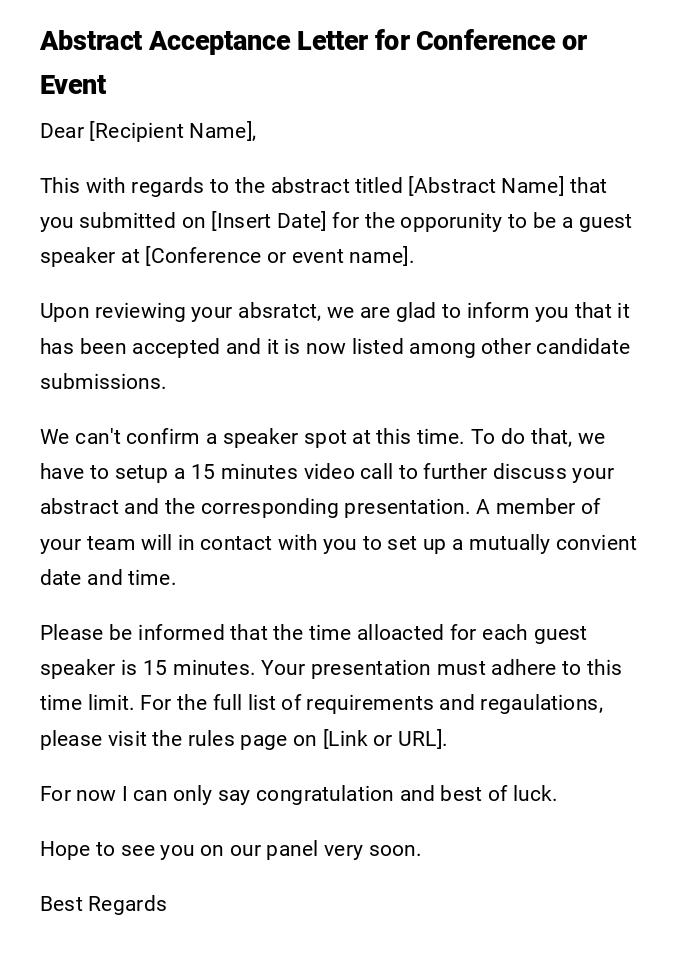

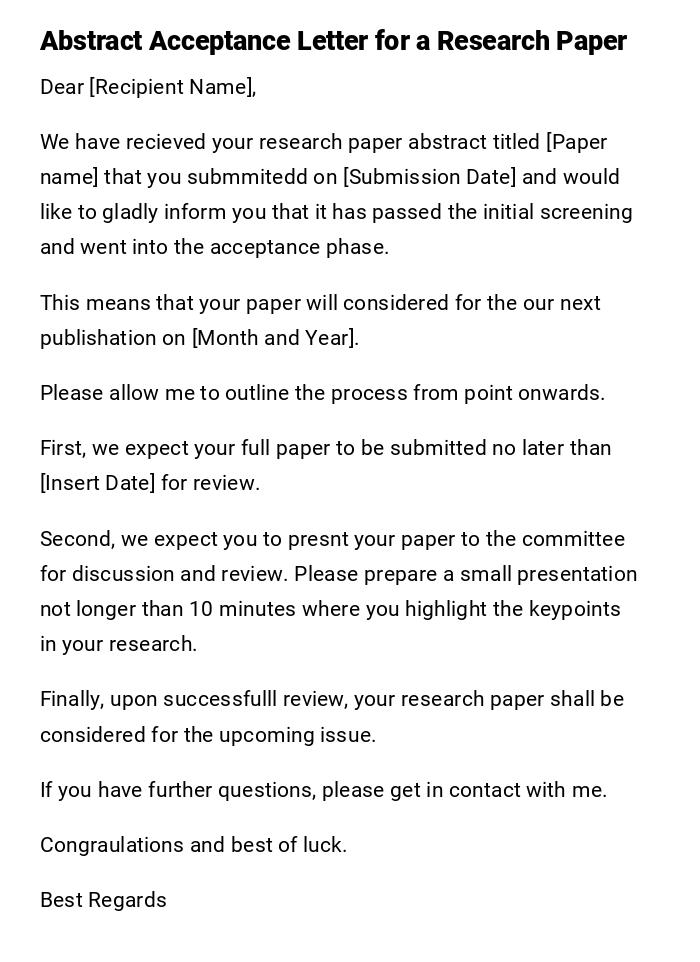
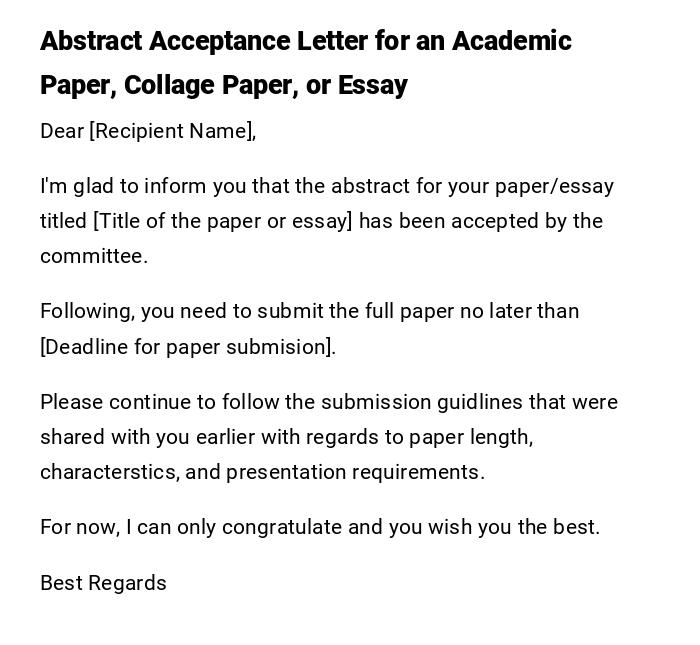
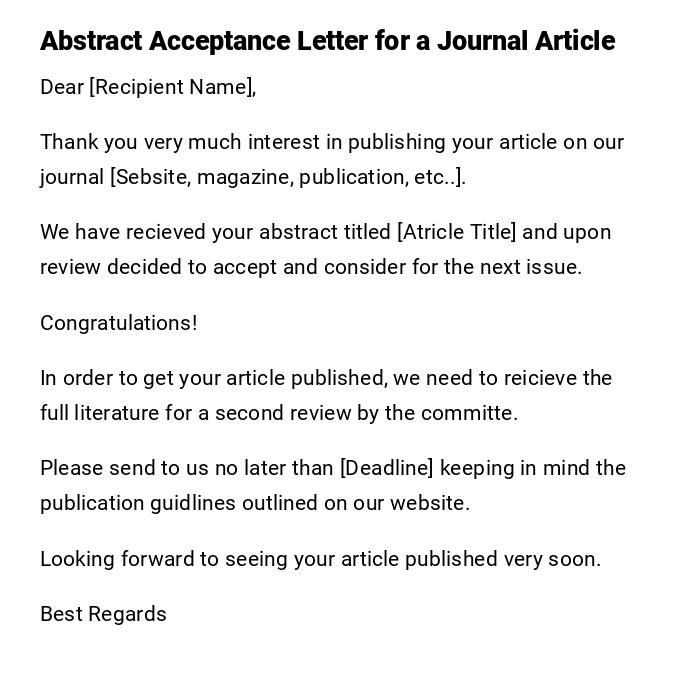
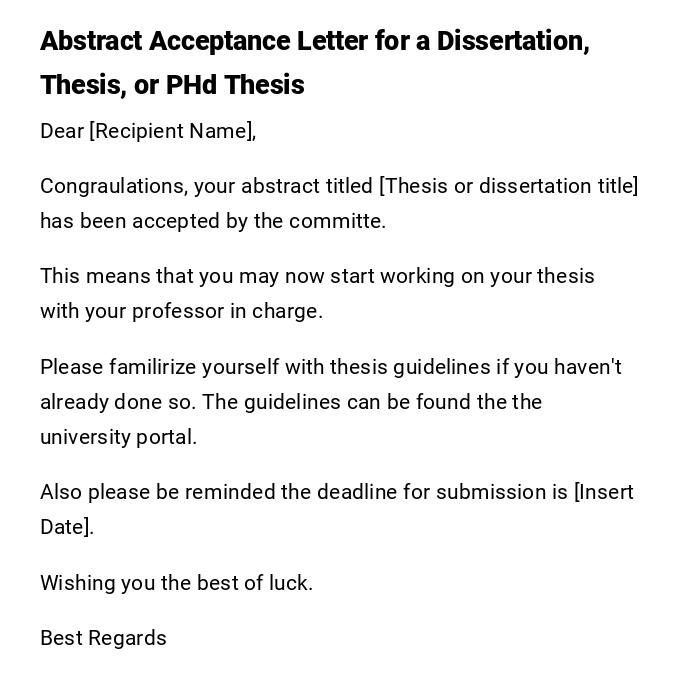
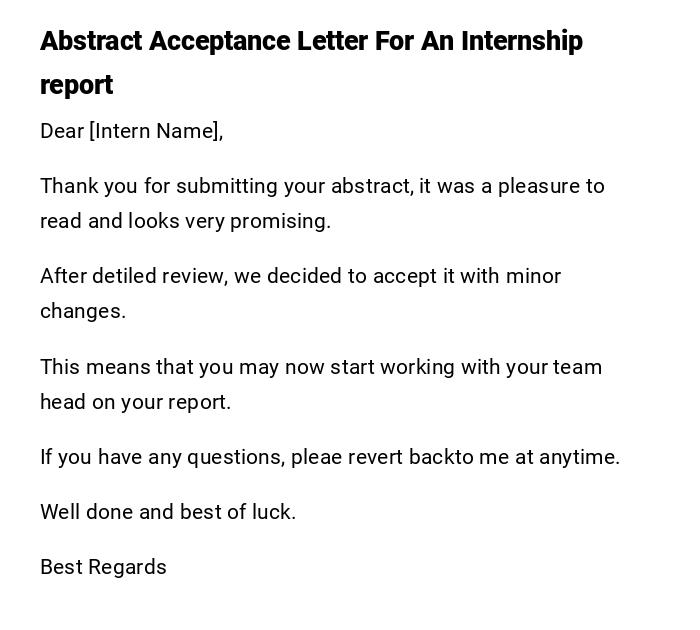
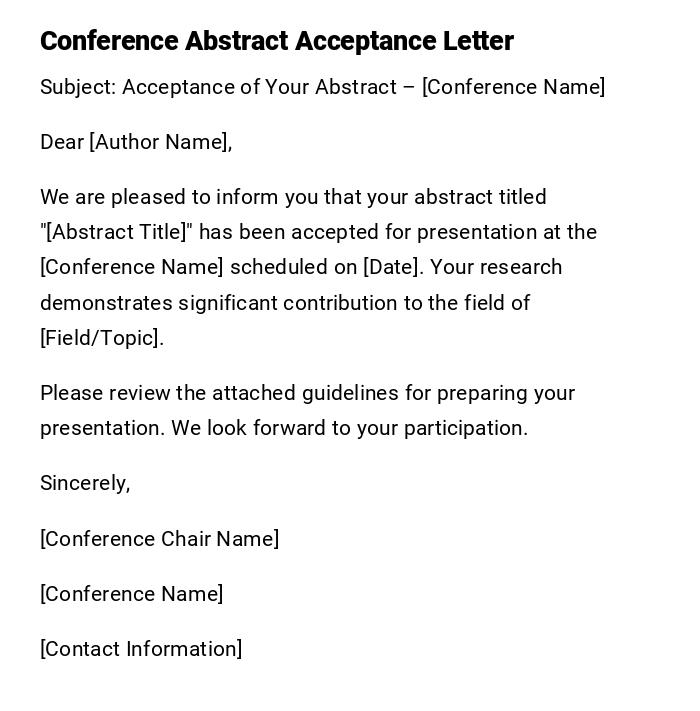
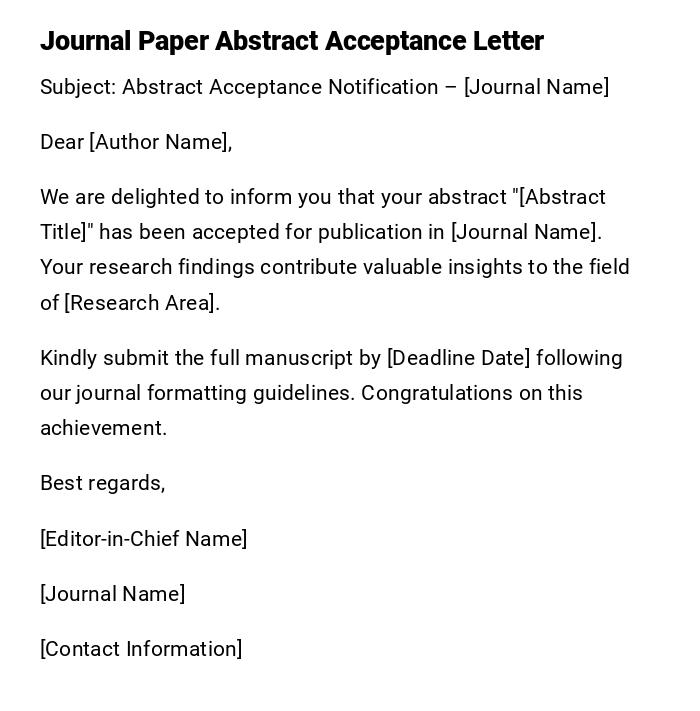
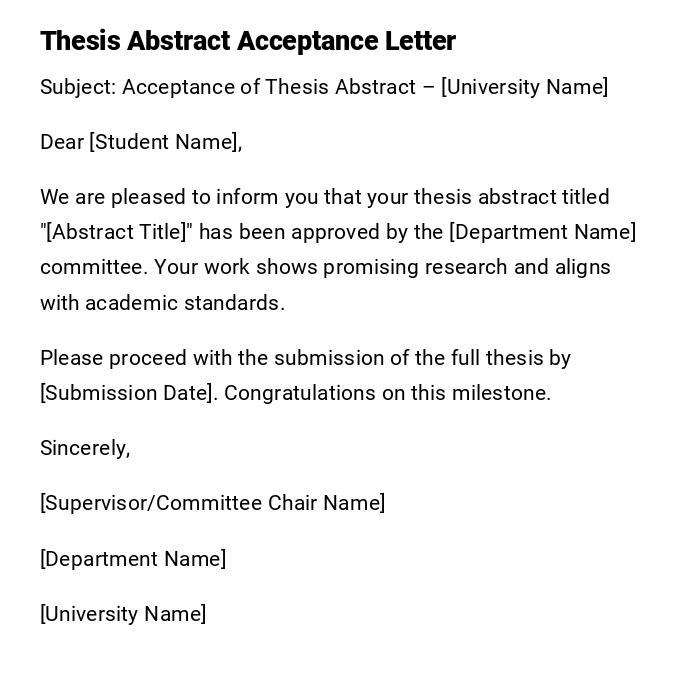
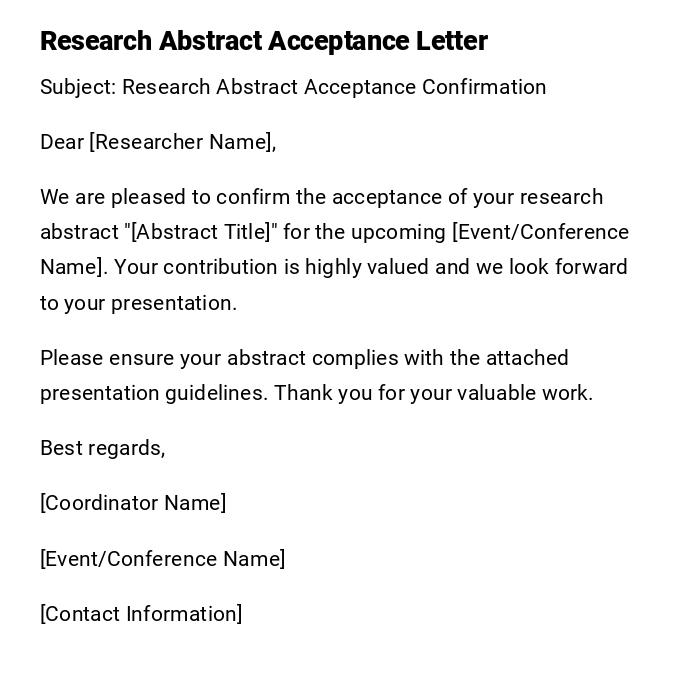
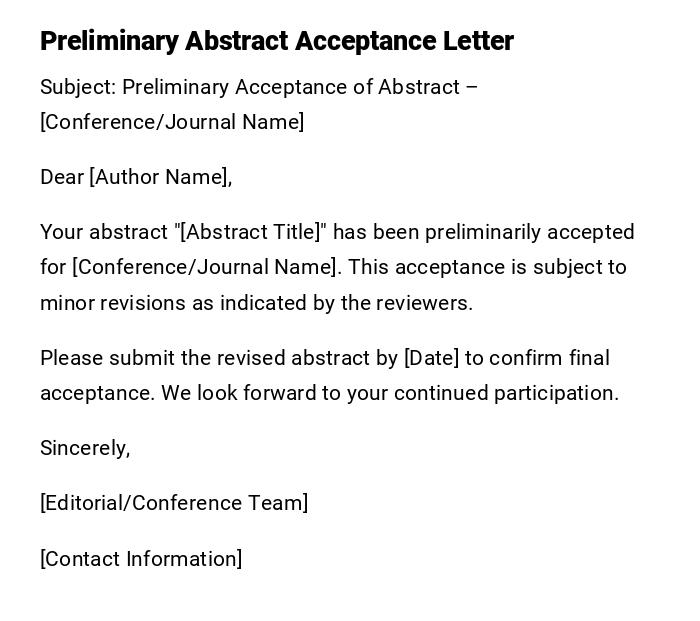
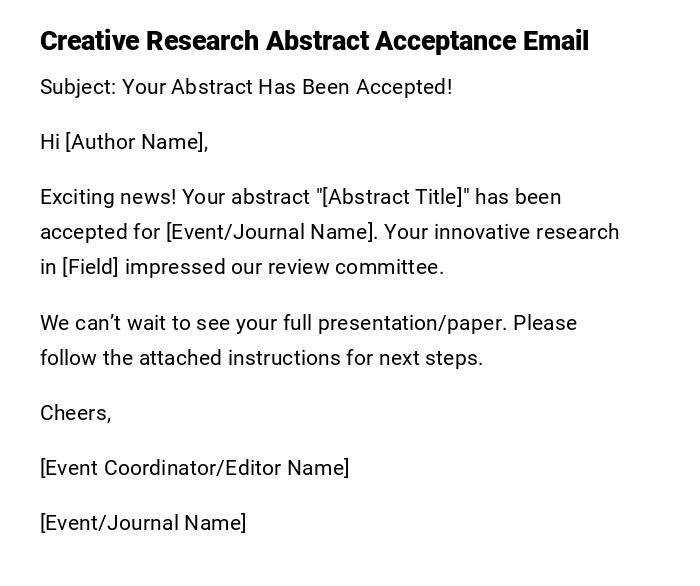
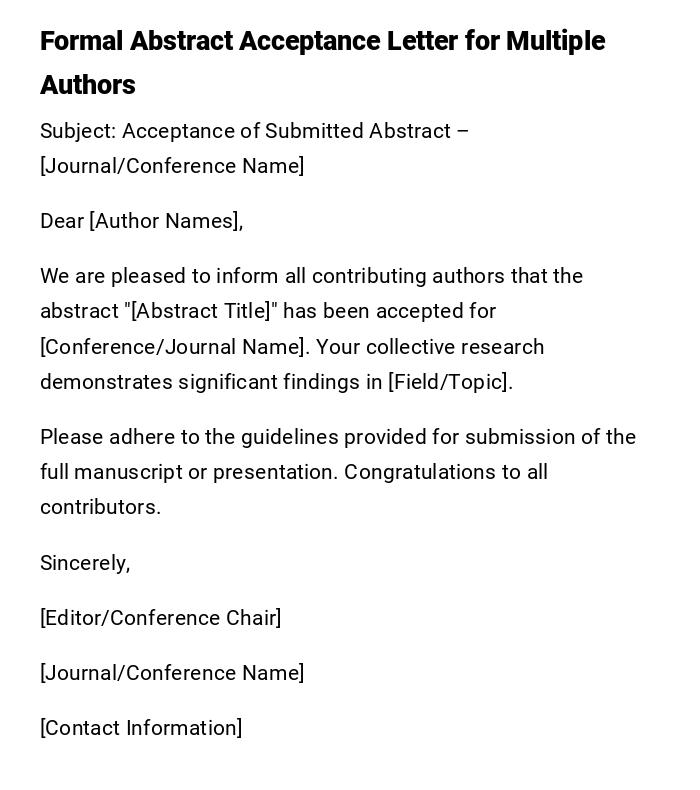

 Download Word Doc
Download Word Doc
 Download PDF
Download PDF